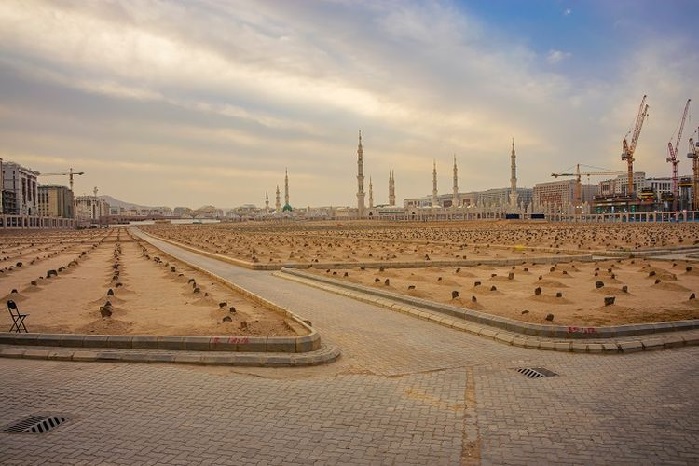
Upon entering the graveyard, one should make salaam to the inmates of the graves in the following words:
Duaa One:
اَلسَّلاَمُ عَلَيْكُمْ أَهْلَ الدِّيَارِ مِنَ الْمُؤْمِنينَ وَالْمُسْلِمِيْنَ وَإنَّا إِنْ شَاءَ اللهُ لَلاَحِقونَ أَسْأَلُ اللهَ لَنَا وَلَكُمُ العَافِيَةَ
O inmates of the resting abode of the believers, may peace descend upon you from the side of Allah Ta‘ala, Insha-Allah soon we will be joining you. I beg Allah Ta‘ala for ease for ourselves and yourselves.
عن سليمان بن بريدة، عن أبيه، قال: كان رسول الله صلى الله عليه وسلم يعلمهم إذا خرجوا إلى المقابر، فكان قائلهم يقول – في رواية أبي بكر -: السلام على أهل الديار، – وفي رواية زهير -: السلام عليكم أهل الديار من المؤمنين والمسلمين، وإنا إن شاء الله للاحقون، أسأل الله لنا ولكم العافية (صحيح مسلم، الرقم: 975)
Hazrat Buraidah (radhiyallahu ‘anhu) reports that Rasulullah (sallallahu ‘alaihi wasallam) would teach them to recite the following dua when they visit the graveyard:
السَّلَامُ عَلَيْكُمْ أَهْلَ الدِّيَارِ(السَّلَامُ عَلَى أَهْلِ الدِّيَارِ) مِنَ الْمُؤْمِنِينَ وَالْمُسْلِمِينَ، وَإِنَّا إِنْ شَاءَ اللهُ لَلَاحِقُونَ، أَسْأَلُ اللهَ لَنَا وَلَكُمُ الْعَافِيَةَ
Duaa Two:
اَلسَّلَامُ عَلَيْكُمْ يَا أَهْلَ القُبُوْرِ يَغْفِرُ اللهُ لَنَا وَلَكُمْ أَنْتُمْ سَلَفُنَا وَنَحْنُ بِالْأَثَر
O inmates of the graves, may peace descend upon you (from the side of Allah Ta‘ala), May Allah Ta‘ala forgive us and you. You have preceded us (in reaching the Aakhirah) and we will soon follow.
عن ابن عباس قال: مر رسول الله صلى الله عليه وسلم بقبور المدينة فأقبل عليهم بوجهه، فقال: السلام عليكم يا أهل القبور، يغفر الله لنا ولكم، أنتم سلفنا، ونحن بالأثر (سنن الترمذي، الرقم: 1053)
Hazrat ibnu Abbaas (radhiyallahu ‘anhuma) reports that on one occasion Rasulullah (sallallahu ‘alaihi wasallam) passed by the graveyard of Madinah Munawwarah. He faced towards them and recited the following dua:
اَلسَّلَامُ عَلَيْكُمْ يَا أَهْلَ القُبُوْرِ يَغْفِرُ اللهُ لَنَا وَلَكُمْ أَنْتُمْ سَلَفُنَا وَنَحْنُ بِالْأَثَر
Duaa Three:
اَلسَّلَامُ عَلَيْكُمْ دَارَ قَوْمٍ مُؤْمِنِيْنَ وَإِنَّا إِنْ شَاءَ اللهُ بِكُمْ لَاحِقُوْن
O (inmates of) the resting abode of the believers, may peace descend upon you (from the side of Allah Ta‘ala), Insha-Allah, soon we will be joining you.
عن أبي هريرة، أن رسول الله صلى الله عليه وسلم خرج إلى المقبرة فقال: السلام عليكم دار قوم مؤمنين وإنا إن شاء الله بكم لاحقون (صحيح مسلم، الرقم: 249)
Hazrat Abu Hurairah (radhiyallahu ‘anhu) reports that once Rasulullah (sallallahu ‘alaihi wasallam) visited the graveyard and recited the following dua:
اَلسَّلَامُ عَلَيْكُمْ دَارَ قَوْمٍ مُؤْمِنِيْنَ وَإِنَّا إِنْ شَاءَ اللهُ بِكُمْ لَاحِقُوْن
Duaa Four:
السَّلَامُ عَلَيْكُمْ أَهْلَ الدِّيَارِ مِنَ الْمُؤْمِنِينَ وَالْمُسْلِمِينَ، وَإِنَّا إِنْ شَاءَ الله بِكُمْ لَاحِقُونَ، أَنْتُمْ لَنَا فَرَطٌ وَنَحْنُ لَكُمْ تَبَعٌ، أَسْأَلُ الله الْعَافِيَةَ لَنَا وَلَكُمْ
O inmates of the resting abode of the believers, may peace descend upon you (from the side of Allah Ta‘ala), Insha-Allah soon we will be joining you. You have preceded us (in reaching the hereafter) and soon we will follow you (to the hereafter). I beg Allah Ta‘ala for ease for ourselves and yourselves.
عن سليمان بن بريدة، عن أبيه، أن رسول الله صلى الله عليه وسلم كان إذا أتى على المقابر فقال: السلام عليكم أهل الديار من المؤمنين والمسلمين، وإنا إن شاء الله بكم لاحقون، أنتم لنا فرط ونحن لكم تبع، أسأل الله العافية لنا ولكم (سنن النسائي، الرقم: 2040)
Hazrat Buraidah (radhiyallahu ‘anhu) reports that Rasulullah (sallallahu ‘alaihi wasallam) would recite the following dua when visiting the graveyard:
السَّلَامُ عَلَيْكُمْ أَهْلَ الدِّيَارِ مِنَ الْمُؤْمِنِينَ وَالْمُسْلِمِينَ، وَإِنَّا إِنْ شَاءَ اللّه بِكُمْ لَاحِقُونَ، أَنْتُمْ لَنَا فَرَطٌ وَنَحْنُ لَكُمْ تَبَعٌ، أَسْأَلُ الله الْعَافِيَةَ لَنَا وَلَكُمْ
Duaa Five:
السَّلَامُ عَلَى أَهْلِ الدِّيَارِ مِنَ الْمُؤْمِنِينَ وَالْمُسْلِمِينَ، وَيَرْحَمُ اللهُ الْمُسْتَقْدِمِينَ مِنَّا وَالْمُسْتَأْخِرِينَ، وَإِنَّا إِنْ شَاءَ اللهُ بِكُمْ لَلَاحِقُونَ
May peace (from the side of Allah Ta‘ala) descend upon the inmates of the resting abode of the believers, and may Allah Ta‘ala shower His mercy upon those who have preceded us (in reaching the aakhirah) and those who are still to pass away, and Insha-Allah soon we will be joining you.
وعن عائشة رضي الله عنها قالت: كيف أقول لهم يا رسول الله قال: قولي: السلام على أهل الديار من المؤمنين والمسلمين ويرحم الله المستقدمين منا والمستأخرين وإنا إن شاء الله بكم للاحقون. (صحيح مسلم، الرقم: 974)
Hazrat Aaishah (radhiyallahu ‘anha) once asked Rasulullah (sallallahu ‘alaihi wasallam), “What should I say to them (to the deceased when visiting the graveyard).” Rasulullah (sallallahu ‘alaihi wasallam) replied, “You should say the following:
السَّلَامُ عَلَى أَهْلِ الدِّيَارِ مِنَ الْمُؤْمِنِينَ وَالْمُسْلِمِينَ، وَيَرْحَمُ اللهُ الْمُسْتَقْدِمِينَ مِنَّا وَالْمُسْتَأْخِرِينَ، وَإِنَّا إِنْ شَاءَ اللهُ بِكُمْ لَلَاحِقُونَ
Duaa Six:
السَّلَامُ عَلَيْكُمْ دَارَ قَوْمٍ مُؤْمِنِينَ، وَأَتَاكُمْ مَا تُوعَدُونَ غَدًا مُؤَجَّلُونَ، وَإِنَّا إِنْ شَاءَ اللهُ بِكُمْ لَاحِقُونَ
O (inmates of) the resting abode of the believers, may peace descend upon you (from the side of Allah Ta‘ala). What you have been promised, soon will reach you tomorrow. Insha-Allah, soon we will be joining you.
عن عائشة، أنها قالت: كان رسول الله صلى الله عليه وسلم كلما كان ليلتها من رسول الله صلى الله عليه وسلم يخرج من آخر الليل إلى البقيع، فيقول: السلام عليكم دار قوم مؤمنين، وأتاكم ما توعدون غدا مؤجلون، وإنا إن شاء الله بكم لاحقون، اللهم اغفر لأهل بقيع الغرقد (صحيح مسلم، الرقم: 974)
Hazrat Aaishah (radhiyallahu ‘anha) reports that when Rasulullah (sallallahu ‘alaihi wasallam) would spend the night by her (i.e. at the end of his life after Hajjatul Wadaa) then during the latter portion of the night, he would (often) visit Jannatul Baqi (the graveyard of Madinah Munawwarah). Rasulullah (sallallahu ‘alaihi wasallam) would then make salaam to the inmates in the following words:
السَّلَامُ عَلَيْكُمْ دَارَ قَوْمٍ مُؤْمِنِينَ، وَأَتَاكُمْ مَا تُوعَدُونَ غَدًا مُؤَجَّلُونَ، وَإِنَّا إِنْ شَاءَ اللهُ بِكُمْ لَاحِقُونَ
Thereafter, Rasulullah (sallallahu ‘alaihi wasallam) would make dua saying, “O Allah, forgive the inmates of Jannatul Baqi.”
 Ihyaaud Deen An Effort to Revive Deen in Totality
Ihyaaud Deen An Effort to Revive Deen in Totality



